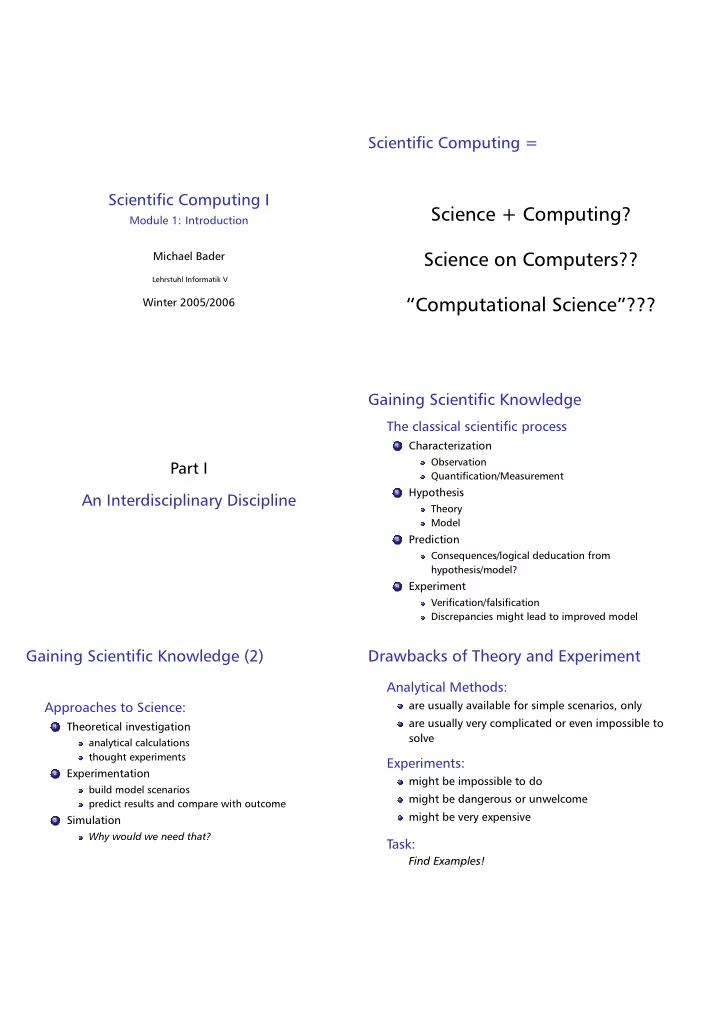

Scientific Computing = Scientific Computing I Science + Computing? Module 1: Introduction Science on Computers?? Michael Bader Lehrstuhl Informatik V “Computational Science”??? Winter 2005/2006 Gaining Scientific Knowledge The classical scientific process Characterization 1 Observation Part I Quantification/Measurement Hypothesis 2 An Interdisciplinary Discipline Theory Model Prediction 3 Consequences/logical deducation from hypothesis/model? Experiment 4 Verification/falsification Discrepancies might lead to improved model Gaining Scientific Knowledge (2) Drawbacks of Theory and Experiment Analytical Methods: are usually available for simple scenarios, only Approaches to Science: are usually very complicated or even impossible to Theoretical investigation 1 solve analytical calculations thought experiments Experiments: Experimentation 2 might be impossible to do build model scenarios might be dangerous or unwelcome predict results and compare with outcome might be very expensive Simulation 3 Why would we need that? Task: Find Examples!
Where Experiments are Impossible Where Experiments are Impossible Astrophysics: Meteorology: “life cycle” of stars, galaxies, . . . Weather forecasts motion of planets, asteroids, comets, . . . Tornado prediction Geophysics: Climate Research: displacement of the earth’s magnetic field greenhouse effect ocean currents (Gulf stream, etc.) continental drift When there is no second try Where Experiments have Harmful Side-effects Stability of buildings: Propagation of pollutants: large span bridges or skyscrapers pollutants in air, water, or soil consider wind loads, earthquakes, . . . predict long-term behaviour Astronautics Nuclear Research: flight path of space crafts or satellites security of nuclear power plants re-entry of space crafts Nuclear weapons Where Experiments are Expensive Car industry: aerodynamics crash tests assembly of parts build prototypes or rather simulate? also combustion processes, vehicle dynamics, . . .
The scientific process revisited Simulation: Characterization Part II 1 observe, quantify, measure, . . . Hypothesis Tasks of Scientific Computing 2 Theory Model ⇒ mathematical modelling Prediction/Experiment 3 Numerical treatment and implementation “Computer experiment” Verification/falsification The Simulation Pipeline Disciplines Involved phenomenon, process etc. ✲ modelling ❄ Mathematics v mathematical model (Modelling, Numerics) a ✲ numerical treatment l Computer Science ❄ i numerical algorithm (Implementation, Visualization) d a ✲ implementation Engineering & Natural Sciences t ❄ (Expertise in Application Area, Modelling, i simulation code o Validification) n visualization ❄ results to interpret ✟ ❍❍❍ ✟ ✟ embedding ✙ ✟ ❍ ❥ statement tool Mathematical Modelling Numerical Treatment Classification, types of models discretization differential equations grid generation, time stepping population models numerical integration of ODE/PDE heat equations continuous vs. discretized model
Implementation Visualization data structures and algorithms visualization techniques platform-aware programming computational steering parallel programming images first? embedding
Recommend
More recommend